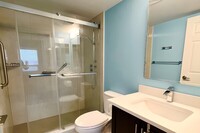
A profession can help you express your thoughts on paper as well as offer fresh ideas. Equally important, the experience and expertise of professionals ensure that the project will meet local building codes and they’ll likely help you avoid expensive mistake.
Meet with prospective contractors to discuss your project. Ask about their experience with bathroom projects as well as problem solving. Ask if they provide project management. Regular meetings to discuss progress and updates on interim deadlines will help to eliminate any issues and misunderstanding.
Ask how long they have been in business and whether they carry insurance. Without insurance you’re liable for accidents that occur on your property.
Obtain references from contractors and take the time to inspect their work.
Narrow your choice to three to five contractors and ask for final estimate/quote. Eliminate from contention any contractor who posts a late estimate/quote; having too much work is not a valid excuse.
Review each estimate carefully to see how thoroughly they have been researched. The estimate should include detail description of each stage.
Take all factors into account, including price, when making the final selection of your general contractor. Be skeptical of any estimate that significantly lower than the others. The lowest bidder may not deliver the most satisfying results.
The finally, open communication. Speak up immediately if you are displeased. The longer you wait the more expensive and difficult corrections will be. A good working relationship will achieve the best results. Keep these tips in mind for the smoothest path to finishing your bath project.
Frequent check-ins. Try to coordinate a time when he or she can discuss progress. That way you can quickly assess the work done the previous day and discuss any problems or upcoming decisions.
Changes in writing. Though you want to minimize changes-they generally are costly - you may need to alter plans after work has started. Put any “change” agreements in writing and make them as precise and detailed as the original contract.
Financial updates. Before the project starts deciding with your contractor how often you’ll discuss money. Frequent checkpoints will allow you both to assess whether the project is on budget. No matter how detailed your contract, delays beyond your control can occur. Be prepared to discuss how problems may affect the budget and how to adjust the plan to keep costs down.


